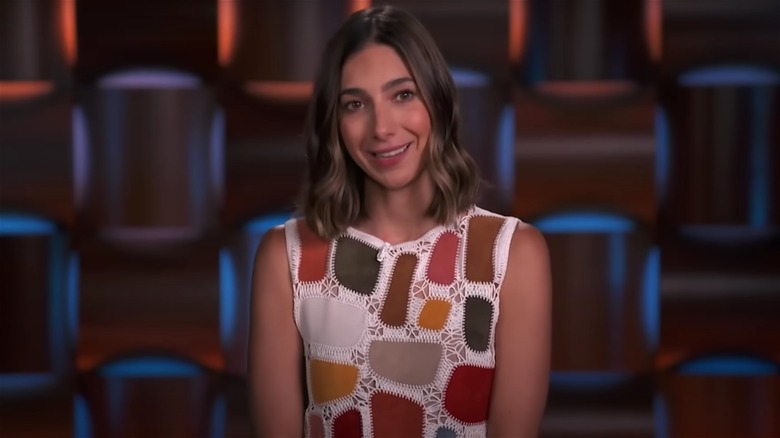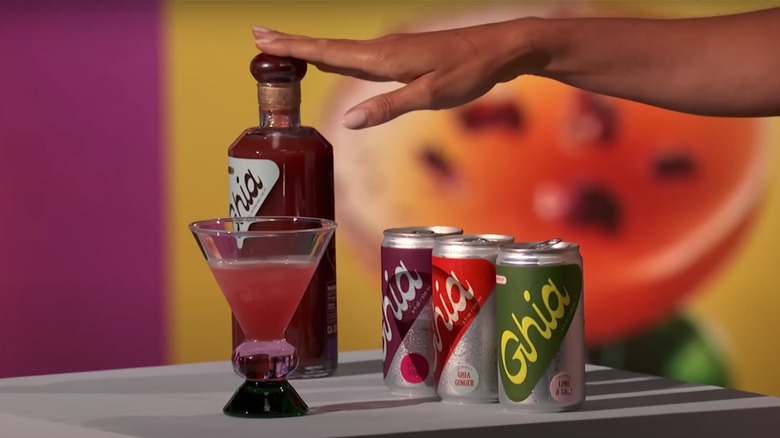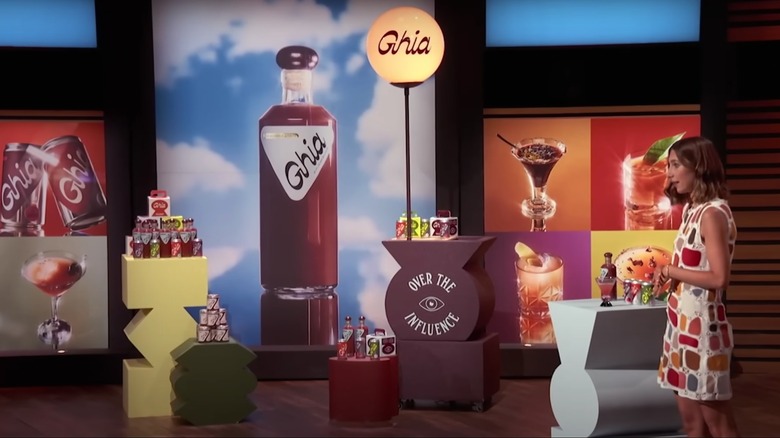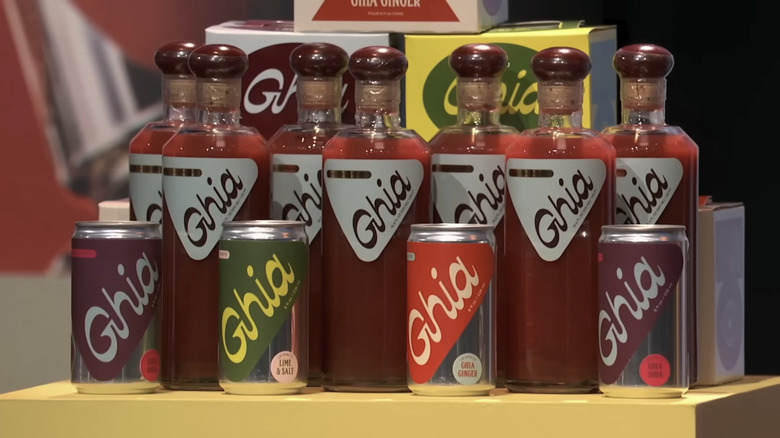Whatever Happened To Ghia After Shark Tank?
Growing up in Lyon, France, Melanie Masarin spent her summers near the Mediterranean, where she and her family would sip on limoncello and amaro in the glow of the sunset into the night. "I was always cooking with my grandma, and my mother and grandmother were always making drinks, but I never realized how big of an impact it had on my life until I moved to the United States," Masarin told Glamour.
When Masarin stopped drinking alcohol, she still wanted to participate in social, celebratory gatherings — just without the fogginess or hangovers. But without a drink in hand, people assumed she was sick, pregnant, or just boring. In 2020, Masarin launched Ghia, a line of non-alcoholic aperitif-inspired beverages. The drinks, she told The Cut, were meant to foster inclusivity, no matter their ABV. "Ghia is an invitation for someone to have a drink in their hand and feel like they're a part of the social environment," she said.
Moreover, the drinks — which come in a bottled aperitif concentrate or as canned spritzes — aren't sickly sweet or sugary like other so-called mocktails. Instead, she aimed for complexity and bitterness, thanks to ingredients like yuzu juice, rosemary extract, and gentian root. "That's what I really wanted to create," Masarin told The Spruce Eats. "Something that would have more than a one-note taste. Something that perhaps is different on the third sip than the first one. Something that would really feel like a grown-up drink."
Melanie Masarin left Shark Tank without a deal
Melanie Masarin enters the "Shark Tank" with more than fond memories of family vacations. She also has an impressive resume that includes positions at Sweetgreen, Glossier, and Goldman Sachs. More importantly, Masarin displays tenacity as a business owner. Although she anticipated launching Ghia in bars and restaurants, the pandemic forced her to pivot to a direct-to-consumer format that was 75% online. Nevertheless, Ghia quickly developed an online community, and the company made $2.5 million in sales in its first year and fundraised $3.5 million. Still, it wasn't yet profitable and lost a little under $1 million.
After raising an additional $6.5 million in funding, Masarin owns 57% of the business at the time of her Season 14 "Shark Tank" appearance, where she is seeking $250,000 for a 5% stake in Ghia. Though the business has an overall valuation of around $40 million, Masarin pitches "Shark Tank" knowing the equity would come directly out of her shares.
Daymond John and Lori Greiner drop out first, since both Sharks are averse to acidic and citrus-forward flavors. Mark Cuban also passes on the product, not wanting to enter the expensive and highly competitive beverage industry.
Robert Herjavec, meanwhile, is a fan of Ghia and commends Masarin's business savvy. "You've somehow picked the hardest category to get into, and you're killing it," he says before offering her the exact deal she is requesting. He drops out, however, when she wants to hear Kevin O'Leary's deal, which turns out to be $250,000 for 10% equity — a deal she is unwilling to make.
Masarin had the confidence to say no
For Melanie Masarin, it was important that she remained the majority shareholder of Ghia, and Kevin O'Leary's desire for 10% equity would have dipped her ownership under 50%.
In refusing the deal, Masarin applied some indispensable business advice she had received in 2018. "I was offered a CEO job when I left Glossier in 2018, and I had never been offered a job of that caliber," she told Bustle. "But something inside me didn't feel right, and I couldn't explain why. I'm a very rational person, and everything told me that I had to take this opportunity."
She looked to her friend Nicolas Jammet, a Sweetgreen co-founder and advisor to Ghia. "He said, 'Just because you have an incredible opportunity doesn't mean that you have to take it.' Now, I spend most of my days saying 'no' to protect the business. It's something that I remind myself of constantly." Saying "no" on "Shark Tank" was one of many refusals that ended up working out.
"I don't know if Robert will regret backing out of that offer," Masarin said at the end of the episode, "But I hope he lets other people speak in the future."
Ghia launched a new formula in 2023
Ghia seems to have had no problem scaling without a "Shark Tank" investor. In the episode, Melanie Masarin projected that the company would make $4.5 million in sales in the rest of 2022 and $7 million in 2023. While it's difficult to corroborate those exact numbers, Ghia has shown no signs of slowing, as evidenced by its dreamy Los Angeles headquarters, which was featured in Domino. Masarin also confirmed that the company grew 77% between Spring of 2022 and 2023.
On April 12, 2023, Ghia launched a rehaul of its flagship aperitif. The bottles' exteriors got a tactile, ribbed redesign created by Willo Perron and Brian Roetttinger — the same minds behind Rihanna's Super Bowl halftime show — and now ship in 100% recycled boxes. The contents of the bottle have been revamped, too. Ghia 2.0 omits figs, which had left a cloudy sediment at the bottom of the bottle. The new formula uses dates, plums, and rhubarb, which achieves the clarity of hero products like Campari and Aperol. Ghia also started making its own orange, ginger, and rosemary extracts in-house.
As part of the redesign, the Ghia aperitif is 46% more concentrated, meaning the $38 price tag will go a lot farther – 17 servings as opposed to the previous 10, to be exact. "I think the biggest upset with [our product] is that it is very expensive," Masarin told Fast Company. "This entire [nonalcoholic] category in general is meant to create more inclusivity."
What's next for Ghia?
Ghia's reformulation was just part of a busy 2023. In June, Ghia announced a partnership with Sweetgreen, Melanie Masarin's former employer. The canned ginger soda is now available at Sweetgreen locations throughout Southern California and New York City.
In July, the company added a new spritz flavor, sumac and chili, to its lineup that already included lime and salt, ginger, and the original Ghia soda. Now, customers can buy the line of spritzes and the aperitif, as well as other products, like puzzles, a signature hazelnut spread, cocktail box sets, and a line of glasses produced in collaboration with Sophie Lou Jacobsen.
Masarin continues to eye additional growth in the future. "We work on so many new flavors, but I want to be very intentional about how we launch them," she said in Julia Bainbridge's "Good Drinks" substack. She also went on to note that the company is looking into the possibility of expanding to new beverages with a bigger market. "This is a big question for us because I love the world of apéritifs, but the American palate doesn't necessarily love dry drinks or bitter drinks."
With that in mind, Masarin is hopeful that Ghia can become an international phenomenon, especially in a market that's more amenable to bitter flavors. "I would also love to see Ghia everywhere around the world!" she told Bristol Farms. " I am very much looking forward to sipping a Ghia spritz near the Mediterranean without having to bring it in my suitcase."




